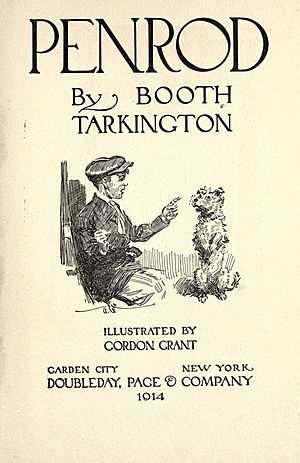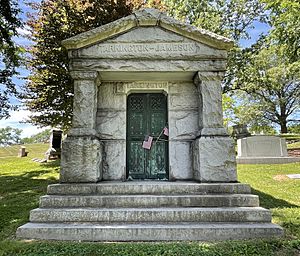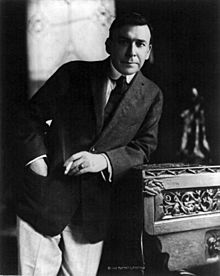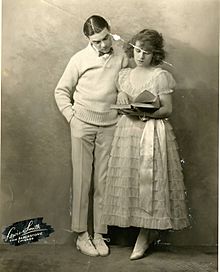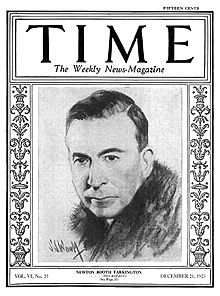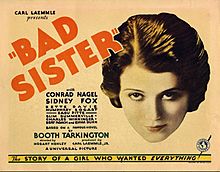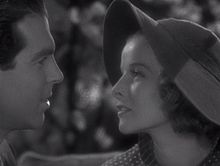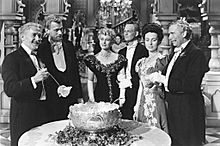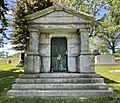Booth Tarkington facts for kids
Quick facts for kids
Booth Tarkington
|
|
|---|---|
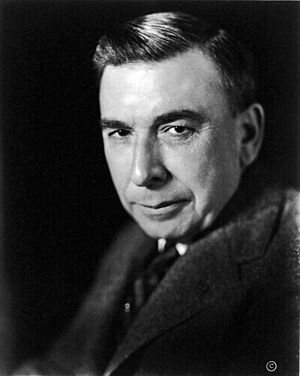
Booth Tarkington (1922)
|
|
| Born | Newton Booth Tarkington July 29, 1869 Indianapolis, Indiana, U.S. |
| Died | May 19, 1946 (aged 76) Indianapolis, Indiana, U.S. |
| Occupation | Novelist, dramatist |
| Education | Shortridge High School Phillips Exeter Academy |
| Alma mater | Purdue University Princeton University |
| Years active | 1899–1946 |
| Notable works |
|
| Notable awards | Pulitzer Prize for Fiction (1919, 1922) |
| Spouse |
Louisa Fletcher
(m. 1902; div. 1911)Susanah Keifer Robinson
(m. 1912) |
| Children | 1 |
| Signature | |
| Member of the Indiana House of Representatives | |
| In office 1902–1903 |
|
Newton Booth Tarkington (born July 29, 1869 – died May 19, 1946) was an American novelist and dramatist. He is famous for his books The Magnificent Ambersons (1918) and Alice Adams (1921). He is one of only four writers to win the Pulitzer Prize for Fiction more than once. In the early 1900s, many people thought he was the greatest living author in the United States. Some of his stories were even made into movies.
Booth Tarkington was part of a "Golden Age" of literature in Indiana during the early 20th century. He also served a short time in the Indiana government. Many of his stories take place in the Midwest. Later in his life, he moved to Kennebunkport, Maine, and kept writing even when his eyesight got worse.
Booth Tarkington's Life Story
Tarkington was born in Indianapolis, Indiana. His parents were John S. Tarkington and Elizabeth Booth Tarkington. He was named after his uncle, Newton Booth, who was the governor of California.
He went to Shortridge High School in Indianapolis. Then he attended Phillips Exeter Academy, a boarding school. He studied at Purdue University for two years. He was part of a fraternity there. Later, he gave a lot of money to Purdue to build a dorm for men, which was named Tarkington Hall in his honor. Purdue also gave him an honorary degree.
College Years at Princeton
After his family got some of their money back, Booth moved from Purdue to Princeton University. At Princeton, he was known as "Tark." He was very active in the school's drama club, which is now called the Princeton Triangle Club. He even helped start the tradition of students writing and producing their own plays.
Tarkington also edited Princeton's Nassau Literary Magazine. While at college, he became friends with Woodrow Wilson, who later became a U.S. President. Tarkington didn't finish his degree because he missed one class. However, he was very popular and was voted "most popular" by his class.
Awards and Special Honors
Even though he didn't get a college degree, Princeton University later gave him two honorary degrees. He is the only person to receive more than one honorary degree from Princeton.
Tarkington won the Pulitzer Prize for fiction twice. He won in 1919 for The Magnificent Ambersons and in 1922 for Alice Adams. In 1921, booksellers voted him "the most important American author" at the time. He also won the O. Henry Memorial Award in 1931 for his short story "Cider of Normandy". His books often appeared on best-seller lists. Besides Purdue and Princeton, other universities also gave him honorary doctorates.
A Midwestern Writer
Tarkington loved the Midwest and set many of his stories in his home state of Indiana. In 1902, he served one term in the Indiana House of Representatives as a Republican. He believed that people from his background should serve the public. This experience helped him write his book In the Arena: Stories of Political Life. He was a conservative person his whole life.
Tarkington was one of the most popular American novelists of his time. His books The Two Vanrevels and Mary's Neck were on best-seller lists nine times. His Penrod novels tell funny stories about a typical American boy from the early 1900s. At one point, his Penrod series was as well known as Huckleberry Finn by Mark Twain.
Much of Tarkington's writing looked closely at the American class system. He came from a wealthy Midwestern family that lost a lot of money after a financial crisis in 1873. Today, he is best known for his novel The Magnificent Ambersons, which Orson Welles made into a movie in 1942. This book is about an "old money" family losing its wealth as "new money" industrial leaders rise.
Tarkington turned several of his novels into plays, and some were made into movies. He also worked with another writer, Harry Leon Wilson, on three plays. In 1928, he wrote a book about his memories called The World Does Move. He also drew pictures for books, including a 1933 version of Adventures of Huckleberry Finn. He was very interested in art and was a trustee for an art institute.
Tarkington was married to Louisa Fletcher from 1902 until they divorced in 1911. They had one child, Laurel, who was born in 1906 and died in 1923. He married Susanah Keifer Robinson in 1912, and they did not have children.
Tarkington started losing his eyesight in the 1920s. He kept writing by telling his stories to his secretary, Elizabeth Trotter. Even with his poor eyesight, he helped edit several historical novels by his neighbor, Kenneth Roberts. Roberts even called Tarkington a "co-author" of his later books.
Tarkington had eye surgery in 1929 and 1930. In 1930, he became completely blind for a while but had more surgeries. In 1931, after five months of blindness, his eyesight improved a lot after a final operation. However, he was not as strong physically after that.
Tarkington kept a home in Indianapolis, Indiana. From 1923 until he died, he spent summers and much of his later life at his home in Kennebunkport, Maine, called Seawood. In Kennebunkport, he was known for sailing his boat, the Regina. His boathouse, The Floats, was also his studio. It is now the Kennebunkport Maritime Museum.
Tarkington gave some of his writings to Princeton University. His wife, Susannah, gave his remaining papers to Colby College after he passed away. Purdue University's library also has many of his works. Indianapolis remembers him through the Booth Tarkington Civic Theatre. He is buried in Crown Hill Cemetery in Indianapolis.
Tarkington's Legacy
In the 1910s and 1920s, many people thought Tarkington was as important as Mark Twain. His books were printed many times, were often best-sellers, won many awards, and were made into movies and plays. His Penrod books were popular birthday gifts for boys who loved to read.
However, by the late 1900s, he was not studied as much in schools. Some people think that if an author is very popular in their own time, their work might not appeal as much to readers later on, because times and values change.
In 2019, the Library of America published a collection of his works, including The Magnificent Ambersons, Alice Adams, and In the Arena: Stories of Political Life.
Booth Tarkington's Works
Book Series
The Penrod Series
- 1914: Penrod
- 1916: Penrod and Sam
- 1929: Penrod Jashber
Two musical movies, On Moonlight Bay (1951) and By the Light of the Silvery Moon (1954), were loosely based on the Penrod books.
The Growth Trilogy
- 1915: The Turmoil
- 1918: The Magnificent Ambersons
- Won the 1919 Pulitzer Prize
- Made into a 1942 movie by Orson Welles and a 2002 TV movie
- 1923: The Midlander (also called National Avenue in 1927)
Novels
- 1899: The Gentleman from Indiana
- 1900: Monsieur Beaucaire
- Later became a play, an operetta, and two movies (1924 and 1946)
- 1901: Old Grey Eagle
- 1903: Cherry
- 1902: The Two Vanrevels
- 1905: The Beautiful Lady
- 1905: The Conquest of Canaan
- 1907: The Guest of Quesnay
- 1907: His Own People
- 1909: Beasley's Christmas Party
- 1912: Beauty and the Jacobin, an Interlude of the French Revolution
- 1913: The Flirt, made into a movie in 1922
- 1916: Seventeen
- 1916: The Spring Concert
- 1917: The Rich Man's War
- 1919: Ramsey Milholland
- 1921: Alice Adams
- Won the 1922 Pulitzer Prize
- Made into movies in 1923 and 1935
- 1922: Gentle Julia
- Filmed in 1923 and 1936
- 1925: Women
- 1927: The Plutocrat
- 1928: Claire Ambler
- 1928: The World Does Move
- 1930: Mirthful Haven
- 1932: Mary's Neck
- 1933: Presenting Lily Mars
- Made into a movie in 1943
- 1934: Rumbin Galleries
- 1934: Little Orvie
- 1936: Horse and Buggy Days
- 1936: The Lorenzo Bunch
- 1941: The Fighting Littles
- 1941: The Heritage of Hatcher Ide
- 1943: Kate Fennigate
- 1945: Image of Josephine
- 1947: The Show Piece (published after he died)
Short Story Collections
- In the Arena: Stories of Political Life (1905)
- The Fascinating Stranger and Other Stories (1923)
Other Short Stories
- 1919: War Stories (one of his stories was in this book)
- Miss Rennsdale Accepts (year unknown)
Collections of Works
- 1904: Poe's Run: and other poems … to which is appended the book of the chronicles of the Elis (with M'Cready Sykes)
- 1921: Harlequin and Columbine
Non-Fiction Books
- What the Victory or Defeat of Germany Means to Every American (1917)
- 1926: Looking Forward, and Others
- The Collector's Whatnot (1923)
- Just Princeton (1924)
- The World Does Move (1929)
- 1939: Some Old Portraits (essays about 17th-century art)
- What We've Got to Do (1942)
- Booth Tarkington On Dogs (1944)
- Your Amiable Uncle (1949)
- On Plays, Playwrights, and Playgoers (1959)
Plays
- 1908: The Man from Home (with Harry Leon Wilson)
- 1910: Your Humble Servant (with Harry Leon Wilson)
- 1917: Mister Antonic
- 1919: The Gibson Upright (with Harry Leon Wilson)
- 1919: Clarence: A Comedy in Four Acts
- 1921: The Country Cousins: A Comedy in Four Acts
- 1921: The Intimate Strangers: A Comedy in Three Acts
- 1922: The Wren: A Comedy in Three Acts
- 1922: The Ghost Story
- 1923: The Trysting Place
- 1926: Bimbo the Pirate
- 1927: Station YYYY
- 1927: The Travellers
- 1930: How's Your Health? A Comedy in Three Acts
- 1935: Mister Antonio: A Play in Four Acts
- 1945: Lady Hamilton and Her Nelson (radio play, written in 1940)
Images for kids
-
Gregory Kelly and Ruth Gordon in Tarkington's 1919 play Clarence
-
Booth Tarkington on the cover of Time (December 21, 1925)
-
Fred MacMurray and Katharine Hepburn in Alice Adams (1935)
-
Richard Bennett, Joseph Cotten, Dolores Costello, Don Dillaway, Agnes Moorehead and Ray Collins in Orson Welles's The Magnificent Ambersons (1942)
See also
 In Spanish: Booth Tarkington para niños
In Spanish: Booth Tarkington para niños
 | William M. Jackson |
 | Juan E. Gilbert |
 | Neil deGrasse Tyson |


